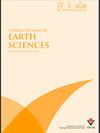解读Cumaçay的岩浆储存条件和喷发前过程:土耳其安纳托利亚东部的上新世-第四纪火山喷发中心
IF 1.1
4区 地球科学
Q3 GEOSCIENCES, MULTIDISCIPLINARY
引用次数: 0
摘要
:我们结合地质年代、大块岩石地球化学、热气压测量和热力学模拟,研究了Cumaçay的地质和岩石学,Cumaçs ay是土耳其东部碰撞后火山活动的上新世-第四纪喷发中心之一。我们新的K-Ar年龄显示,喷发产物的年龄为3.5–0.97Ma,分布在大约1000平方公里的区域。橄榄石、斜方辉石、单斜辉石和斜长石的矿物熔体平衡允许估计结晶压力,温度表明在14–28公里和5–15公里处有两个独立的结晶地壳储存。不同方法的温度估计范围为954°C至1224°C。使用具有代表性的压力(5kbar)下的岩浆室模拟器(MCS)进行的热力学建模表明,同化和地壳污染(AFC)导致了地壳中下部具有不同SiO2含量的演化熔体。计算出的大范围温度、演化成员的成分变化以及代表性压力(2.5 kbar)下的MCS补给模拟表明,对比熔体之间的岩浆混合是喷发熔岩最终化学扩散的特征。本文章由计算机程序翻译,如有差异,请以英文原文为准。
Deciphering the magma storage conditions and preeruptive processes at Cumaçay: a Plio-Quaternary volcanic eruption center in Eastern Anatolia, Turkey
: We investigate the geology and petrology of Cumaçay, one of the Plio-Quaternary eruption centers of postcollisional volcanism in Eastern Turkey, using a combination of geochronology, bulk-rock geochemistry, thermobarometry, and thermodynamic simulations. Our new K-Ar ages reveal an age of 3.5–0.97 Ma for the eruptive products, which spread around an area of approximately 1000 km 2 . Mineral-melt equilibria for olivine, orthopyroxene, clinopyroxene, and plagioclase allow estimation of crystallization pressures, and temperatures indicate two separate crustal storage of crystallization at 14–28 km and 5–15 km. The temperature estimation from diverse methods ranges from 954 °C to 1224 °C. Thermodynamic modelings using Magma Chamber Simulator (MCS) at a representative pressure (5 kbar) imply that the assimilation and crustal contamination (AFC) resulted in evolved melts with various SiO 2 contents at mid to lower crustal depths. Calculated wide range of temperatures, compositional variety from evolved members, and MCS recharge simulation at a representative pressure (2.5 kbar) reveal that the magma mixing between contrasted melts characterizes the final chemical dispersal of the erupted lavas.
求助全文
通过发布文献求助,成功后即可免费获取论文全文。
去求助
来源期刊

Turkish Journal of Earth Sciences
地学-地球科学综合
CiteScore
2.40
自引率
10.00%
发文量
6
审稿时长
6 months
期刊介绍:
The Turkish Journal of Earth Sciences is published electronically 6 times a year by the Scientific and Technological Research
Council of Turkey (TÜBİTAK). It is an international English-language journal for the publication of significant original recent
research in a wide spectrum of topics in the earth sciences, such as geology, structural geology, tectonics, sedimentology,
geochemistry, geochronology, paleontology, igneous and metamorphic petrology, mineralogy, biostratigraphy, geophysics,
geomorphology, paleoecology and oceanography, and mineral deposits. Contribution is open to researchers of all nationalities.
 求助内容:
求助内容: 应助结果提醒方式:
应助结果提醒方式:


